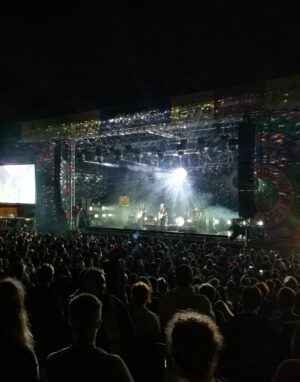How does the shown object point to a better world?
The photo shows a performance of the rock band Tocotronic in 2019 at the Donauinselfest in Vienna. It is pleasantly warm, only a light breeze provides a little — welcome — refreshment. Around me: many unknown people and some friends (some people I haven’t seen for a long time). Those present come close to each other: they greet each other joyfully, hug each other heartily, well viennese, many kisses are spread on the cheeks of many people, crowded people are waiting at the bars to get a cool drink. Everything seems and feels distant — without distance to the others, without distance to oneself. At the moment. I’m as happy as a little child when the band starts a song of their debut album: “Last year in summer”. Dirk (I don’t know him personally, and yet he accompanied me for many years) sings: “Every day I go to the bathroom and wash myself, every day I pour cold water on my face. It’s clear that nothing happens overnight, but at some point I had less worries, for example last year in summer. I am happy.
This is how I imagine a better world:
My utopia is not oriented towards the common good in the narrow sense. It does not aim (directly) at the big picture, a better world. It is deeply personal, perhaps even, I think, in a certain sense, selfish and elitist. It is also not too ‘utopian utopia’, but comparatively realistic — at least for me. It refers back to a moment that could take place again in a similar form in the near future. And yet there is something general about it: moments without distance.
This text was translated by machine. See original text.


